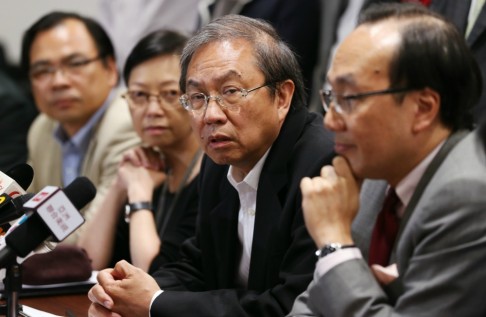
New | Democrats urged to reconsider leaving alliance after Occupy Central poll
Lawmakers had looked set to leave pan-democratic group, but with the alliance's 2017 plan winning the public's backing, key figures have called for unity
The Democratic Party has been urged to stay within with an alliance of pan-democrats, as opposition lawmakers and pro-democracy activists move to rally behind the political reform proposal that won Occupy Central’s unofficial referendum.
Joseph Cheng Yu-shek, the convenor of the Alliance for True Democracy – an alliance of all but one of the 27 pan-democrat lawmakers – was speaking on a radio programme on Monday morning after nearly 800,000 people voted in Occupy’s public poll on options for the 2017 chief executive election.
The alliance’s election plan – which would allow the public, political parties and a nominating committee to put forward candidates for the top job – secured 331,427 votes, or 42.1 per cent of the 787,767 valid ballots cast during the 10-day exercise.
The central and local governments have repeatedly ruled out public nomination.
Before the vote, Democrats had threatened to leave the alliance after other members – notably from the People Power group – did not support the alliance’s plan in an initial vote held by Occupy supporters to create the shortlist of three proposals.
People Power lobbied for support of its own reform proposal.
“I very much hope that the Democratic Party will stay with us and fight this battle. After all it is the biggest party in Hong Kong, with the longest history,” Cheng said.
“Even if they still want to leave, I hope they can be an observer in our future meetings to promote the alliance’s proposal,” Cheng added.

Benny Tai Yiu-ting, one of the founders of the Occupy movement, also appealed for unity within the pan-democratic camp, although he did not mention the Democrats by name.
Whether the alliance would continue to exist or not, “the alliance’s proposal has become the Occupy scheme and we will take it to negotiate with the government,” Tai said.
Occupy organisers will now champion the alliance’s plan, under which candidates can be nominated by 35,000 registered voters or by a party which secured at least five per cent of the vote in the last Legco election.
The plan did not specify on the formation of the nominating committee, only stating that it should be “as democratic as it can be”.
On Tuesday, hundreds of thousands of Hongkongers are expected to join a march in support of democracy and human rights through the city.
Tai also said he would not rule out the possibility of a meeting with Beijing representatives.
“If they want to know who we are, that we are not someone organising a colour revolution or some sort of terrorists, as pro-Beijing newspapers described,” Tai said.
But negotiations with the government on the details of the final and official reform proposal would have to be carried out together with pan-democratic politicians and could not just involve Occupy organisers, he added.
Joshua Wong Chi-fung, convenor of the student-led group Scholarism that backed one of the three proposals in the unofficial referendum, said he would respect the poll results.
But Wong said Scholarism would continue to work to ensure that the public is given the chance to nominate candidates in 2017, and questioned if pan-democrats were united in achieving that goal.
“I want to ask the pan-democrats – do they really agree that public nomination is indispensible? And will they strive for a nominating committee that is formed as democratically as possible?” Wong said.

